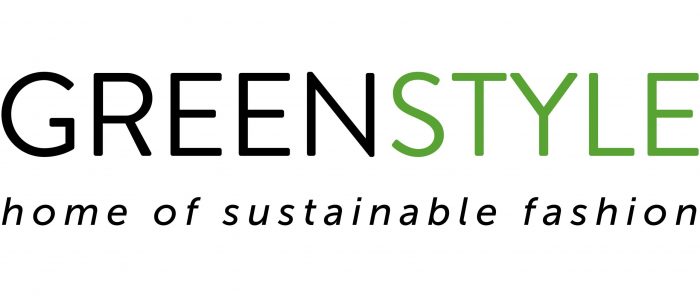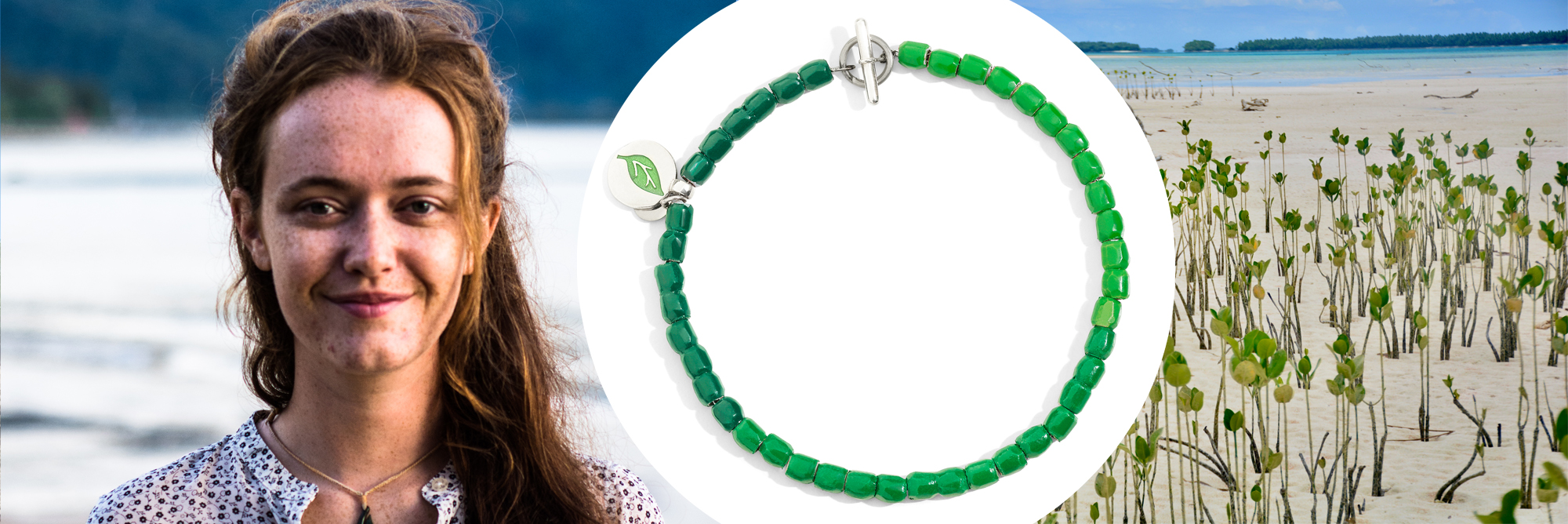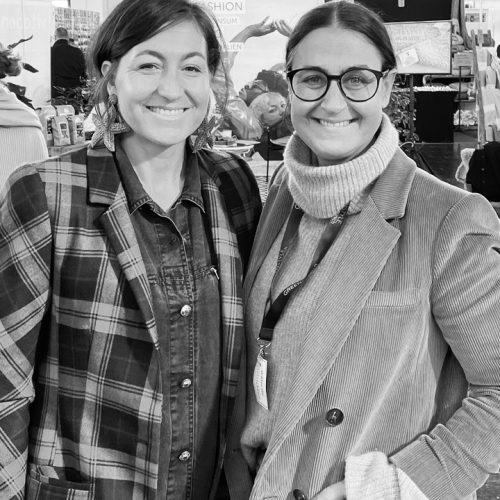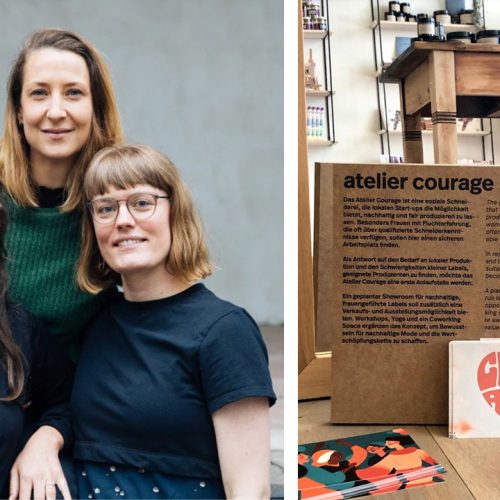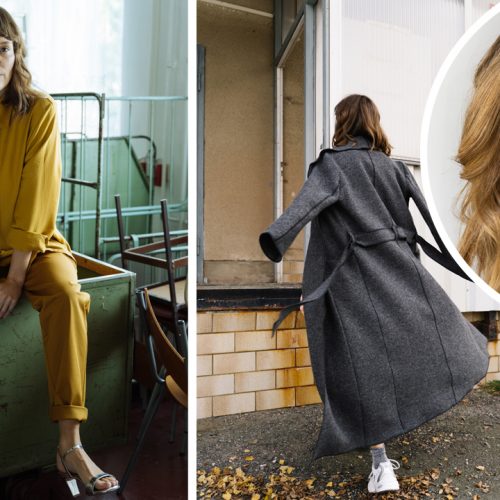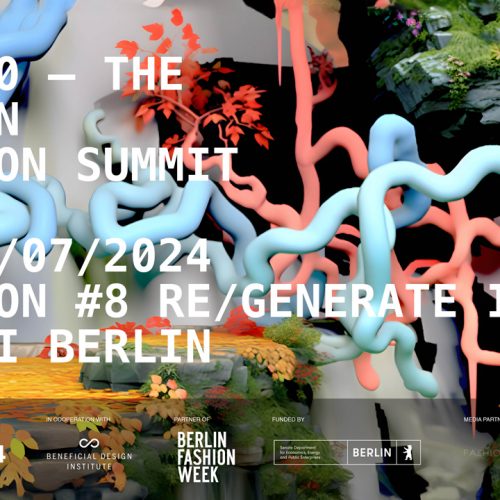Thanks to the environmental documentary “Seaspiracy” (be sure to check it out), I literally immersed myself in a topic that I had obviously not dealt with sufficiently before. And then I came across the Italian jewelry brand DoDo. In addition to its iconic charms (made of Responsible Gold), the Italian company, whose namesake DoDo died out at the end of the 17th century, has committed itself to promoting issues such as inclusion, gender equality and environmental protection issues (Code of Ethics).
Mangrove forests store at least five times more carbon dioxide per hectare than an inland forest.
After working with WWF and Treedom, DoDo is committed to preserving the oceans. DoDo has teamed up with 26-year-old Frenchwoman Anne-Sophie Roux and her non-profit organization Tēnaka (she founded when she was 23). Together they restored 1,000 square meters of coral coast off the Malay island of Tioman last year. This year the focus is on the restoration and preservation of mangroves, which have an enormous impact on the binding of CO2, but are very much endangered by deforestation.
And what is a DoDo?
For all those who don’t know who or what a DoDo is: The Dodo was a flightless bird about one meter tall that lived exclusively on the island of Mauritius in the Indian Ocean before it became extinct at the end of the 17th century. That is why DoDo is committed to giving nature back important ecosystems, alleviating the effects of climate change and guaranteeing the preservation of biodiversity for the future.
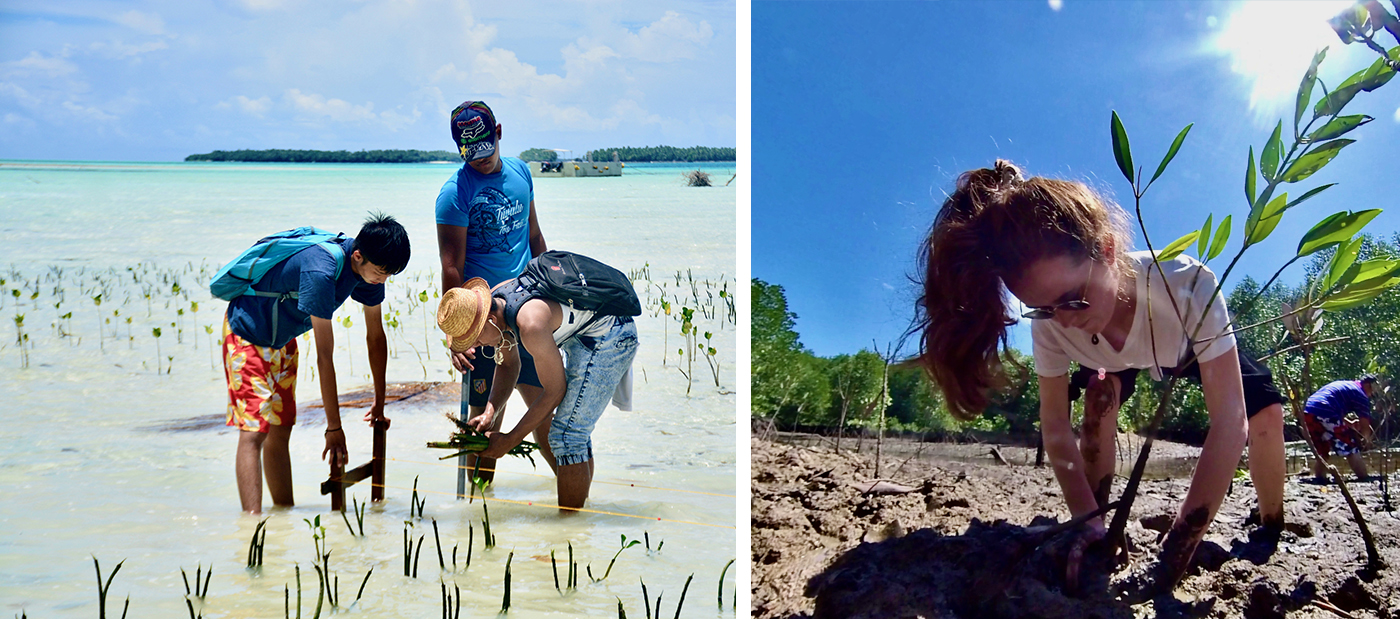
Mirjam Smend in conversation with Tēnaka founder Anne-Sophie Roux
GREENSTYLE: When did climate change become such a big part of your live?
Anne-Sophie Roux: The environment has always been an important issue for me. That I will dedicate my life to the climate crisis and the corresponding solutions – I decided during my studies at Po University in Paris, when I was researching this topic against a social science background. I wanted to help solve this problem.
GREENSTYLE: Planting trees is important. Planting Mangroves even more. Why?
Anne-Sophie Roux: We often think of the importance of rainforests as a green lung and the effects of deforestation. In fact, the ocean is the largest CO2 store on our planet. If you compare the surface of a classic forest with a mangrove forest, mangroves can bind five times more CO2. Even if mangroves make up less than one percent of all tropical forests, their impact on the global climate is enormous, as they are the most efficient of all marine habitats in terms of storing carbon dioxide.
GREENSTYLE: What does the Ocean mean to you?
Anne-Sophie Roux: Very much. But first and foremost: the feeling of beauty. I am fascinated by marine habitats. From the smallest to the largest marine life – all of them are fascinating. And a feeling of hope, because the ocean is one of the most resilient living spaces. Since the Covid crisis, we have clearly seen that the ocean can recover if we let it rest, to heal, to breathe again. Then marine life quickly returns to their normal habitats. Every little action we take to help the ocean recover – rebuilding a coral reef as well as planting mangroves has an enormously positive impact on our planet.
GREENSTYLE: What was the moment that made you building up your own business?
Anne-Sophie Roux: During a gap year I did field research as a volunteer on various projects in Asia in the Pacific. I’ve seen the enormous impact it has when you support and revitalize the ocean. Not just for the environment. Also for local communities. And the local economy. For biodiversity. It became clear to me that if we scale what we are doing locally, then we can bring about global change. That’s why I founded Tēnaka.
GREENSTYLE: And what does the name mean?
Anne-Sophie Roux: The word is Maori and means something like “to connect with each other”. I believe in the power of synergies. Collaboration between people from different fields, local communities, scientists, governments. And I believe in the power of cooperation. We want to bring people and actors together, build bridges so that we can achieve more together.

GREENSTYLE: Can you give us a little insight into your daily work?
Anne-Sophie Roux: We look after many planting sites in Southeast Asia. I coordinate the teams on site, document how many mangroves have already been planted, how things are going with the impact report and the monitoring. I take care of the Impact Measurement Tools. And I coordinate the cooperation with our partners such as DoDo. We are just starting to work with the government that supports us with our Blue Carbon program, in which DoDo also participates. And at the end of the day, the greatest reward is when we get pictures of the location where we can see the actual progress of our work as the ecosystem continues to grow.
GREENSTYLE: Which came first Diving or your enthusiasm for the ocean?
Anne-Sophie Roux: Actually, both came at the same time. I come from the French Alps. I discovered the ocean late. I did various internships in marine biology that made me fall in love with the sea. It gave me hope and opened my eyes to the enormous role the ocean is playing in solving our climate crisis. Learning more about the sea and learning to dive was the beginning of this passion.
GREENSTYLE: You are a passionate diver. Can you still dive for fun reasons or is this always with your mission in mind?
Anne-Sophie Roux: My scientific approach accompanies me on all of my dives. That’s how I learned it. It was always about observing and evaluating interactions between algae, fish, the fauna and flora of the ocean. I love understanding these interactions.
GREENSTYLE: The last year was a very special one for everyone. For the ocean too. What did you see there?
Anne-Sophie Roux: During the first lockdown last year, it was seen that natural habitats recover very quickly if humanity leaves them alone. Overall, the crisis has resulted in humanity being more in touch with nature again. Giving more importance to nature again. We very much hope that this newfound awareness will lead to greater support for the protection and reconstruction of the ocean and its habitats.
GREENSTYLE: What was the most impressive moment in your Tēnaka life?
Anne-Sophie Roux: There are quite a few. During the planting of the DoDo Coral Reef in June last year, shortly after we had set up the DoDo Nursery Farm, turtles suddenly came back. This is a wonderful and rare moment, and so important in terms of preserving the reef. After a few months we noticed that our plantings had enabled the turtles to nest here. We had not expected that. It made us very happy to see what we can achieve with our work.
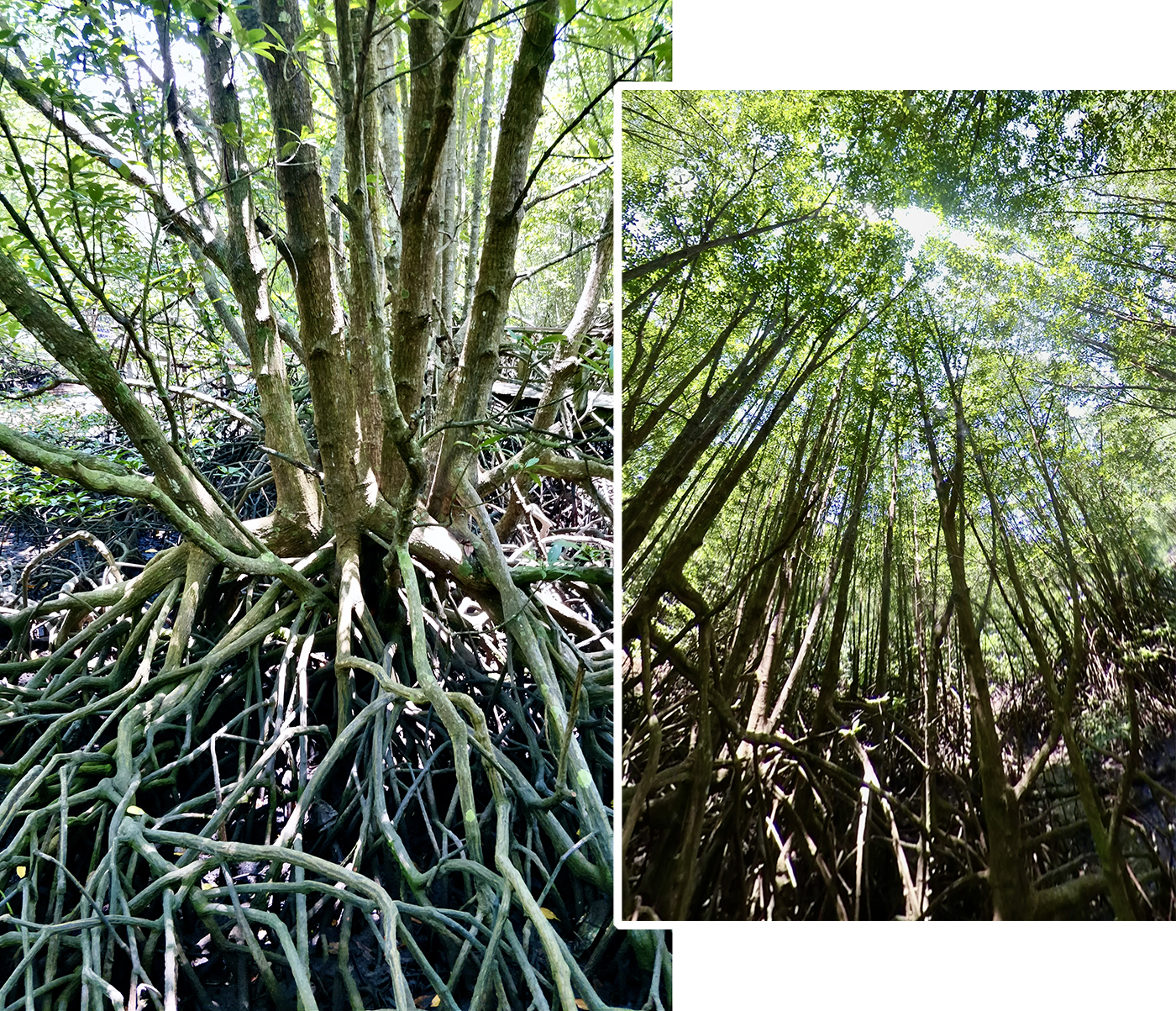
GREENSTYLE: This is not your first time working with DoDo. Can you tell us a little bit about the current project?
Anne-Sophie Roux: Last year’s project had a focus on the coral reefs. This year’s new program focuses on mangroves, which sequester more carbon than most other ecosystems. Both incredibly important topics in dealing with the climate crisis. We have our local teams on site in Malaysia who take care of the plantings and monitor the subsequent monthly monitoring. The monthly Impact Report is published on our website at Tēnaka Science. This gives our partners and their customers an insight into the commitment of the respective company. There you can see which fish are returning and how much CO2 has been bound. Most of the project is not the planting. The big part is the long-term monitoring of this program.
Mangroves are among the three most important carbon-sequestering ecosystems on earth
This partnership is so important to us because DoDo is a renowned company that, through its commitment to awareness of the ocean, can create the most important element in overcoming the climate crisis. DoDo is involved in many areas and that feels very right to us. And for me that is the future: All companies should be as committed as DoDo. That is why we are proud of our collaboration.
GREENSTYLE: How do such projects come about?
Anne-Sophie Roux: The priorities for such projects are assigned by our marine biologists. Just like the ecosystems, the places where we operate.
GREENSTYLE: Can you give us some numbers for the “DoDo Blue Forest” project so that we can better imagine it?
Anne-Sophie Roux: This year we are planting 3000 mangroves on two hectares of coastline. To do this, we work with 20 scientists. We involve schools on site in order to sensitize and inspire the young generation for the topic. This project means that we bind 900 tons of CO2 every year. We assume that around 3000 different marine and land creatures will be protected as a result. This is not just about CO2. There are very important co-benefits in this program, such as jobs for local communities, for scientists, fishing, tourism.
GREENSTYLE: You have been recognized as a YOUNG OCEAN LEADER. Does that mean there is a growing movement of young activists?
Anne-Sophie Roux: Absolutely. The young generation is aware of the fact that they are very, very at the forefront when it comes to the climate crisis and its effects. This generation will be the first to be maximally affected. We have social media etc. as a very easy way to communicate. The world is much easier for us to get involved. Whether it’s online activism or social entrepreneurship or working with local organizations – we have many options. We have to act, find solutions and solve problems. Each in his own way. We have many opportunities to get involved. We just have to do it. And it feels great to be able to contribute.
GREENSTYLE: Are you connected to each other? Is there a network?
Anne-Sophie Roux: I am part of a worldwide organization by and for young people who have chosen to preserve the ocean. Over 80 countries are represented there. We help each other, support each other and learn from each other.
GREENSTYLE: I just saw the environmental documentary “Seaspiracy” on Netflix. What significance do documentation of this type have for awareness among the population and for change?
Anne-Sophie Roux: “Seaspiracy” worked as a maximum multiplier. The topic has reached an incredible number of people in a very short time. It is very important that something happens at this level. But I was also a little frustrated because the documentary was not set up in a solution-oriented way. Of course, it’s incredibly important that many people understand that our oceans are in danger, that marine fishing is not really sustainable, but the only solution this film offered was to stop eating fish. What we need is solution-oriented documentation and to work with large numbers that sensitize humanity to these issues. Above all, it has to be communicated that we can still change something if we start now.
GREENSTYLE: What can you say to our readers?
Anne-Sophie Roux: Too often we think that we as individuals do not have the opportunity to change something. But we often forget what we can do with our consumption habits alone. We can choose sustainable brands and companies that produce ethically instead of using greenwashing as a marketing tool. Consumer pressure means that companies no longer have the choice of whether to work sustainably or not. We have the power.
Thank you for your commitment and the interview, Anne-Sophie.
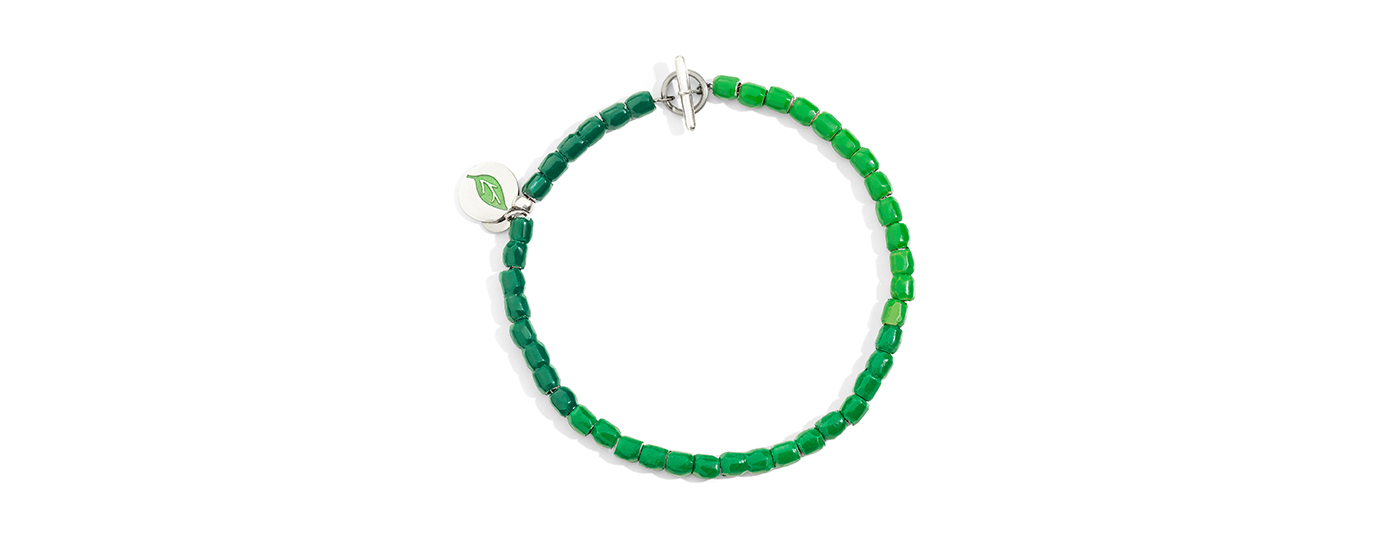
Support now: DoDo for Tēnaka
DoDo’s commitment to environmental protection is symbolized by the DoDo for Tēnaka Granelli bangle made from marine plastic. The plastic parts were fished out of the Mediterranean by REVET from Pisa, transformed and dyed in shades of green to remind of the beauty of the mangroves.
